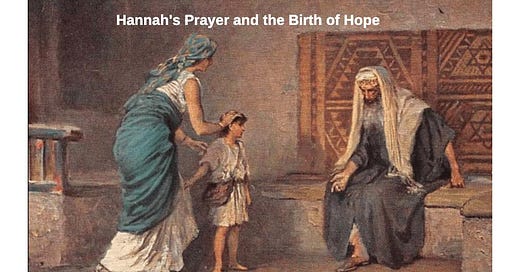Her name is not Hannah, but her journey echoes that of Samuel's mother. She was loved by her husband, had a successful life, yet her joy was marred by childlessness. Despite seeking various treatments, she remained unable to conceive. Pressure mounted on her husband to divorce her – in that ancient culture, a man without children was likened to a barren tree. She often saw her womb as a tomb and began to lose hope of ever having her own child.
Our reading today comes from 1 Samuel, recounting how Hannah, Samuel's mother, dedicated him to serve in the Lord's sanctuary in Shiloh under the guidance of the priest, Eli. For those unfamiliar with the story (for more details, refer to 1 Samuel 1), Hannah and Peninnah were Elkanah's two wives. While Peninnah had children, Hannah faced the stigma and pain of being childless in an era where it was considered shameful for a woman. Elkanah's family had a tradition of yearly pilgrimages to a sanctuary in Shiloh, offering sacrifices to the Lord. During one of these pilgrimages, Hannah prayed fervently for a son, vowing to offer him to the Lord's service. The Lord granted her request, and today's reading marks the fulfillment of that promise.
The theme of barren women giving birth to significant children recurs in the Bible. From Sarah, Rebekah, Rachel, Samson's mother, to Elizabeth, these women initially struggled with childlessness. Even today, despite societal changes, infertility brings immense pain and shame to many women. How did Hannah cope? Lacking advanced medical treatment and not seeking a surrogate mother like Sarah, she turned to prayer: "O LORD of hosts, if you will indeed look on the affliction of your servant and remember me and not forget your servant, but will give to your servant a son, then I will give him to the LORD all the days of his life" (1 Samuel 1:11).
Our modern "Hannah" also turned to prayer and attended a retreat conducted by a former childless couple. Seeing the couple's daughters stirred emotions within her. After a heartfelt conversation with the mother, a change occurred. She returned home calm, peaceful, and filled with hope. Miraculously, she conceived and gave birth to a baby boy.
Hannah means "favour" or "grace," and Samuel means "God has heard." The two names perfectly capture the essence of today's story. God heard Hannah's prayer and bestowed upon her the grace of a son who would become one of Israel's greatest prophets. Her story foreshadows the Christmas narrative, wherein a virgin named "Full of grace" gave birth to a son named "God's salvation." Since then, the world has never been the same.
The stories of barren women remind us of the power of prayer, hope amidst despair, and the miraculous ways in which God intervenes in human lives, bringing forth salvation and changing the course of history.




